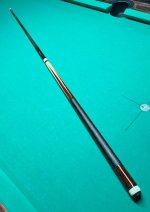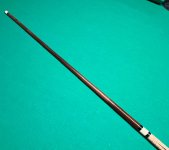I'm glad to know there are other crazy players out there looking for their cue's 'Sweet Spot.'Hard for me to disagree with a hall of fame cue builder but think how many other hall of fame cue builders prefer maple. One other advantage of ash is that quality ash is easier to come by, might be why the builder tried to push ash.
They mostly use maple for baseball bats with some ash being used. Under the demands a pro ball player puts on a bat the cell walls of an ash bat break down and the bat goes flat. I have long wondered if the same thing happens to an ash cue shaft. Ash is more common in snooker than pool but I have never heard of a cue or cue shaft going flat. Even if it did, I don't know if that would be a bad or good thing. A cue is hitting end grain rather than side grain but I don't know how that affects cell structure.
I think quality carbon fiber shafts will come down to under three hundred dollars. When and if they do I think the writing will be on the wall for competition players, the end of the wooden shaft for practical purposes. They still have wooden racquet tennis matches, and some purists will play with wood as long as they play.
Your thread creates some interesting paths of thought. I don't really have any absolute answers. If I still had my cue shop I would build butts to look their best with carbon fiber shafts. I like wood but I hope nobody notices me turning my carbon fiber shaft trying to index a shaft that doesn't have a sweet side.
Thanks for starting a thread that causes some thought!
Hu
You are using an out of date browser. It may not display this or other websites correctly.
You should upgrade or use an alternative browser.
You should upgrade or use an alternative browser.
Anybody use an ash shaft?
- Thread starter Ascue
- Start date
And if they find it they may get a "responsive" return!I'm glad to know there are other crazy players out there looking for their cue's 'Sweet Spot.'
That happened to me once when I kissed my new girl friend! Very responsive!
>just trying to help Freddie out
responsive<reacting quickly and positively.
George the Greek
Well-known member
A friend only had ash cues when his poolhall burnt down.
They are available from certain cuemakers. I don't think they look like a whittled down 2x4 as the snooker cues do.I was actually referring to my English pool cue. Though, yes, all my snooker cues are also ash.
But yeah, I can see that OP was referring to American pool cues. Are ash shafts even available for those types of cues? I've never even heard of them being used.
I was just walking my parents property and they have a forest worth of dead ash trees. Those damnable bugs got them good. Careful what you import! The trees of the UK are safe for nowGiven what the Emerald Ash Boring Beetle has done to the Ash population, you may find it difficult to source decent material.
Just thinking out loud.
Carry on.
vintagecollectibles831
Well-known member
I was actually referring to my English pool cue. Though, yes, all my snooker cues are also ash.
But yeah, I can see that OP was referring to American pool cues. Are ash shafts even available for those types of cues? I've never even heard of them being used.
I see that he did not specify what type of cue, but I have never seen a pool cue with an Ash wood shaft. I have seen pool players using Ash snooker cues, but very rarely. I knew a guy from India who always used a Snooker cue, for pool.
Jon Turner
New member
As a neophyte cue maker myself, i produce shafts in maple, ash, purple heart, Keilwood, or carbon depending on customer request. I will play with any of them. Keep in mind my game is at a level where they all play similar enough. A better player will have preferences for sure.
My cuemaker is striving for best feel. Not everyone notices different feel in cues. Many can't notice a difference that a full splice gives. Or a wood to wood joint vs steel vs phenolic. I appreciate all the answers given by ash users. Thankyou.As a neophyte cue maker myself, i produce shafts in maple, ash, purple heart, Keilwood, or carbon depending on customer request. I will play with any of them. Keep in mind my game is at a level where they all play similar enough. A better player will have preferences for sure.
Paul_#_
Well-known member
Ash was discussed in 2008 in this post:
Here are snippets from that discussion:
Shaft -- maple vs ash...?
My cue builder gave me an option to make a shaft in ash instead of one in maple. I wonder if anyone could explain the pros/cons and the different characteristics between a shaft made in ash vs maple? My dad always raved about the strengths of ash (often used in tool handles, etc.) but except...
forums.azbilliards.com
Here are snippets from that discussion:
i think the brass ferrules hit way too hard for the heavier pool balls. i would suggest maybe a tan phenolic ferrule or even a short white pool ferrule.
The so-called Janka Hardness test measures the pounds of force it takes to drive a .444" diameter steel ball half the way of its depth into the wood. In this test, maple got a Janka hardness rating of 1450, while ash has 1320. As a reference, ebony's Janka rating is a whopping 3220.
There might be a similar test for flexibility, but since I haven't found one yet, I got in contact with that wood expert who told me that ash is more flexible than maple.
Anyway started playing with the new shaft and played badly, so I figured it must be the cue so went and bought a predator reasoning that if I missed I knew it was my fault and not the cue. Recently I bought some sniper tips and put them on all my shafts - including the 'Parris' ash shaft which I hadn't touched in years. I love it, a solid hit but with 'feel' something I never got from the predator. The feel may be helped by the brass joint which I am certain is better than the predator steel one.
I also have a billiard cue with a maple shaft. The wood of an ash has a naturally harder hit and the maple's hit has considerably more finesse. To ME, anyway.
here is no rule against metal ferrules. bca rules say if it is metal, it can't be more than 1 inch though. that is the only limitation i know of
I got that too... In the form of a slap!! Does that count??And if they find it they may get a "responsive" return!
That happened to me once when I kissed my new girl friend! Very responsive!
>just trying to help Freddie out
responsive<reacting quickly and positively.
I am playing with one now.
I bought a 5A torrified Ash shaft blank from Prather, and Cory Barnhart finished it for me.
Hit is subjective.. I did not like the way it played with a medium Everest tip on it, so I put a hard G2 tip on it, and it is very responsive... it feels close to maple, in playability... maybe a little softer. Cory's shaft have a bit firmer taper to them, also.
It is lighter in weight than maple... Mine is 12.7mm, 29.5", and weighs 3.2oz. My playing cue with this shaft weighs right at 18oz, so that suits me fine.
If grain in your line of sight bothers you, I would not bother with one. However, I grew up as a snooker player, and I like the look.
Here are a couple of pix on my Barnhart player.
I bought a 5A torrified Ash shaft blank from Prather, and Cory Barnhart finished it for me.
Hit is subjective.. I did not like the way it played with a medium Everest tip on it, so I put a hard G2 tip on it, and it is very responsive... it feels close to maple, in playability... maybe a little softer. Cory's shaft have a bit firmer taper to them, also.
It is lighter in weight than maple... Mine is 12.7mm, 29.5", and weighs 3.2oz. My playing cue with this shaft weighs right at 18oz, so that suits me fine.
If grain in your line of sight bothers you, I would not bother with one. However, I grew up as a snooker player, and I like the look.
Here are a couple of pix on my Barnhart player.
Attachments
Last edited:
I've built several of the roasted ash shafts, last 2 cues I sold on here had one included with them.
I personally like the way they play a lot.

I personally like the way they play a lot.

